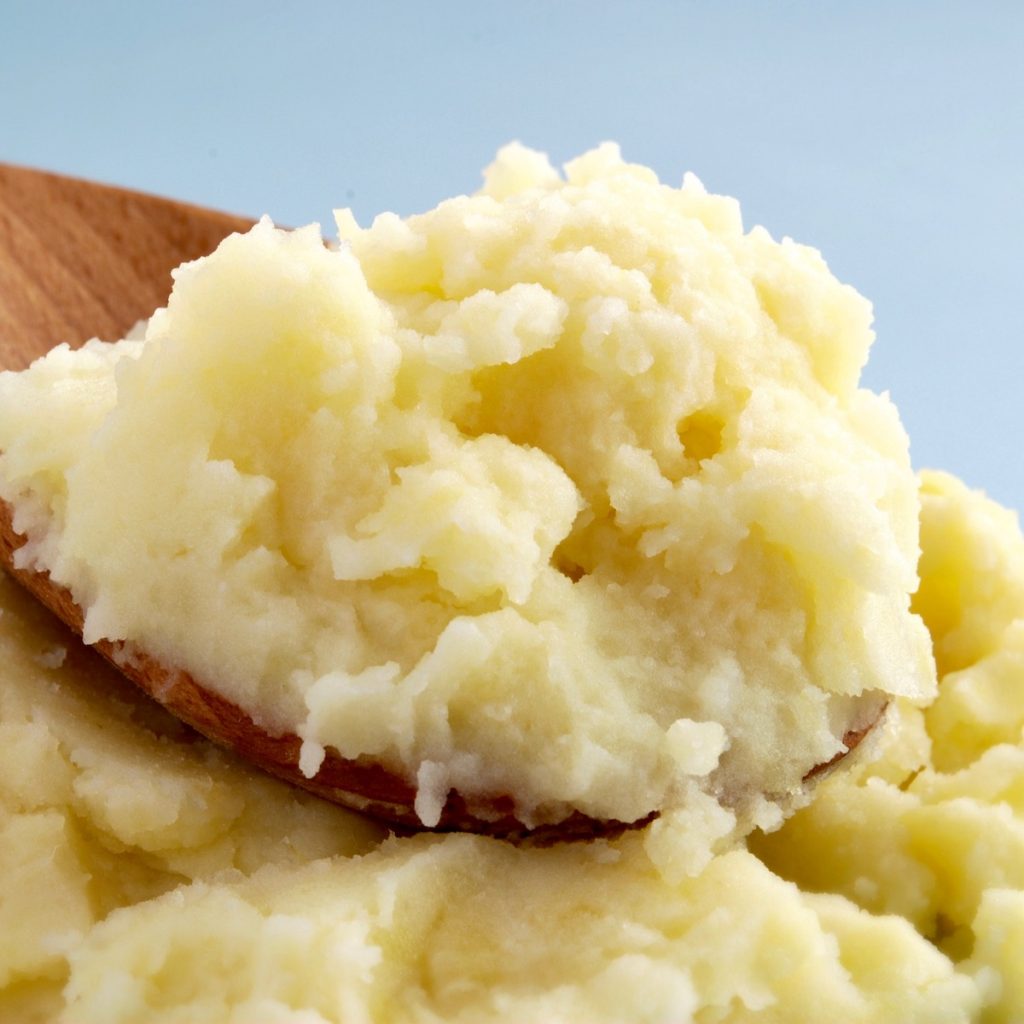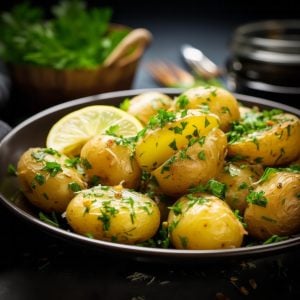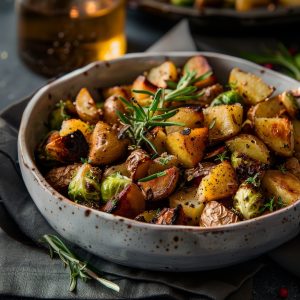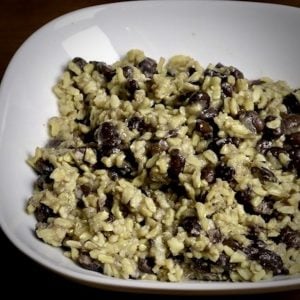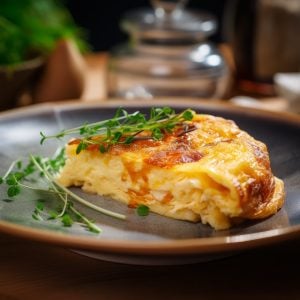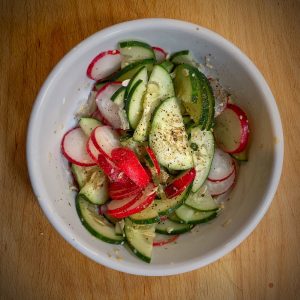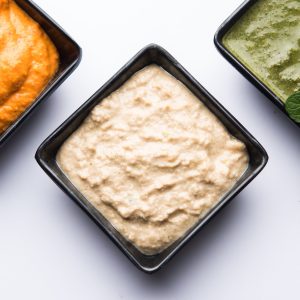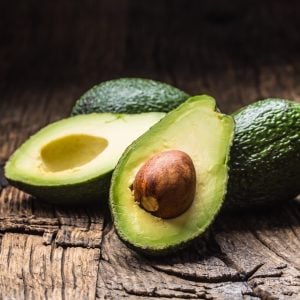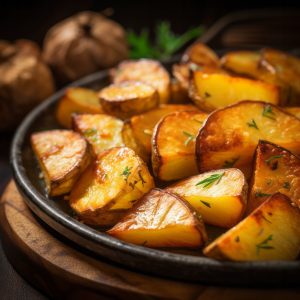Mashed Potato Frequently Asked Questions
Should I peel the potatoes before cooking?
This is purely a personal preference. I peel my potatoes first, but I also know people who leave the peels on and then peel them after they are cooked. This sounds like more work than I want, but it is an option.
Alternatively, you could bundle the peels together in cheesecloth and boil them along with the potatoes, like that technique I read about a while ago.
How should I cook my potatoes for mashing?
Most people boil their potatoes. If you will boil yours, start your potatoes in cold water, turn the heat up to medium-high, and bring the potatoes to a boil. Reduce the heat and simmer the potatoes until you can pierce them with a fork with almost no resistance.
The time this takes depends on how many potatoes you have in your pan and how large or small you have cut them.
Can I bake my potatoes for mashing?
You can bake your potatoes for mashing. However, boiling introduces water to the potato naturally and can somewhat dilute the flavor.
You can remove some of this water by letting the boiled potatoes dry over low heat in a lidded pot for about five minutes after draining. Baking very nicely sidesteps the issue of watery mashed potatoes.
Baking doesn’t introduce any water. Some of the water in the potato will evaporate in the oven, giving you a more concentrated potato flavor.
The only downside is that it takes longer to bake a potato than it takes to boil one. If you plan ahead, though, that should be fine.
Should I salt the water for my mashed potatoes?
If you will boil your potatoes, you should salt the water. When cooking pasta, this is the only way to get flavor into the potato. Well-salted water will taste just like seawater.
You can also add pepper or even herbs to the cold water. Those flavors will be drawn into the potato right along with the salt.
I wasn’t sure this would work, but I experimented with it one day, and the potatoes tasted wonderful–well seasoned and peppery–before I added additional seasonings.
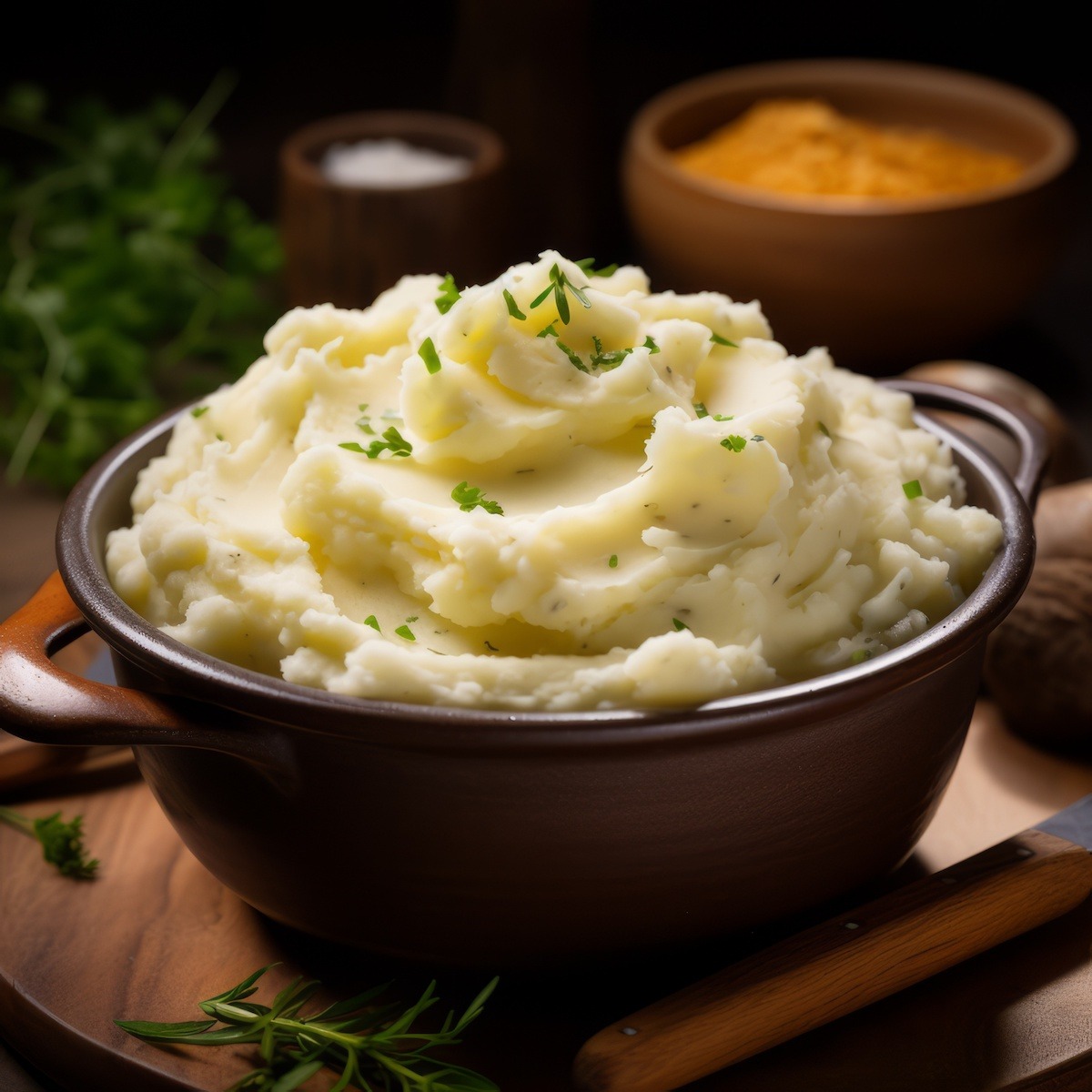
When should I add the butter? The dairy?
This is how I mash my potatoes:
a. mash the potatoes along with some salt and pepper
b. add the butter and continue mashing
c. add the dairy and mash some more.
d. Taste and add any additional seasonings until I like how they taste
Well, it turns out that this is the right way to mash potatoes. When making a pie crust, you work in the butter to coat the flour and limit gluten formation.
The butter (or whatever fat you’re using) coats the starch granules and helps to keep them intact and from getting gluey when you add the other liquid. Once the fat is thoroughly mashed into the potatoes, add the other liquid.
Can I add other ingredients to my mashed potatoes?
Of course, you can. After all, they’re your potatoes! You can mash in fresh herbs, cheeses–anything from cream cheese to cheddar to Swiss–crumbled bacon, anything that a) sounds good and b) goes with whatever else you’re serving.
For example, try mashing in some mustard powder and cheddar cheese for a British-inspired twist to mashed potatoes.
Are you having roast beef? Mash in some prepared horseradish and some roasted garlic. You don’t have to use all potatoes, either. Substitute part of the potatoes with turnips or parsnips. If you’re feeling very gourmet, mash in some cooked celery root or sunchoke.
Half and Half?
Really? I’m watching my figure! I mash my potatoes with half and half because that’s how my mom did it, and I like them that way.
You can use any dairy that you choose: buttermilk, 1% milk, skim milk, and whole milk are all options. If you’re not concerned with the calories, consider mashing your potatoes with sour cream, full-fat plain yogurt, or even some heavy cream.
I’m lactose intolerant.
Can I still make mashed potatoes? Just because most mashed potatoes contain dairy doesn’t mean they have to. You can certainly mash your potatoes with any broth or stock.
You can even use some of your potato (or other vegetables) cooking water as part of your liquid—experiment with plain soy milk, rice milk, or similar.
If you have a juicer, mash your potatoes with fresh vegetable juice. Celery would be delicious. Please stay away from brightly colored juices, though–the color might be a little weird, and remember, we eat with our eyes first!
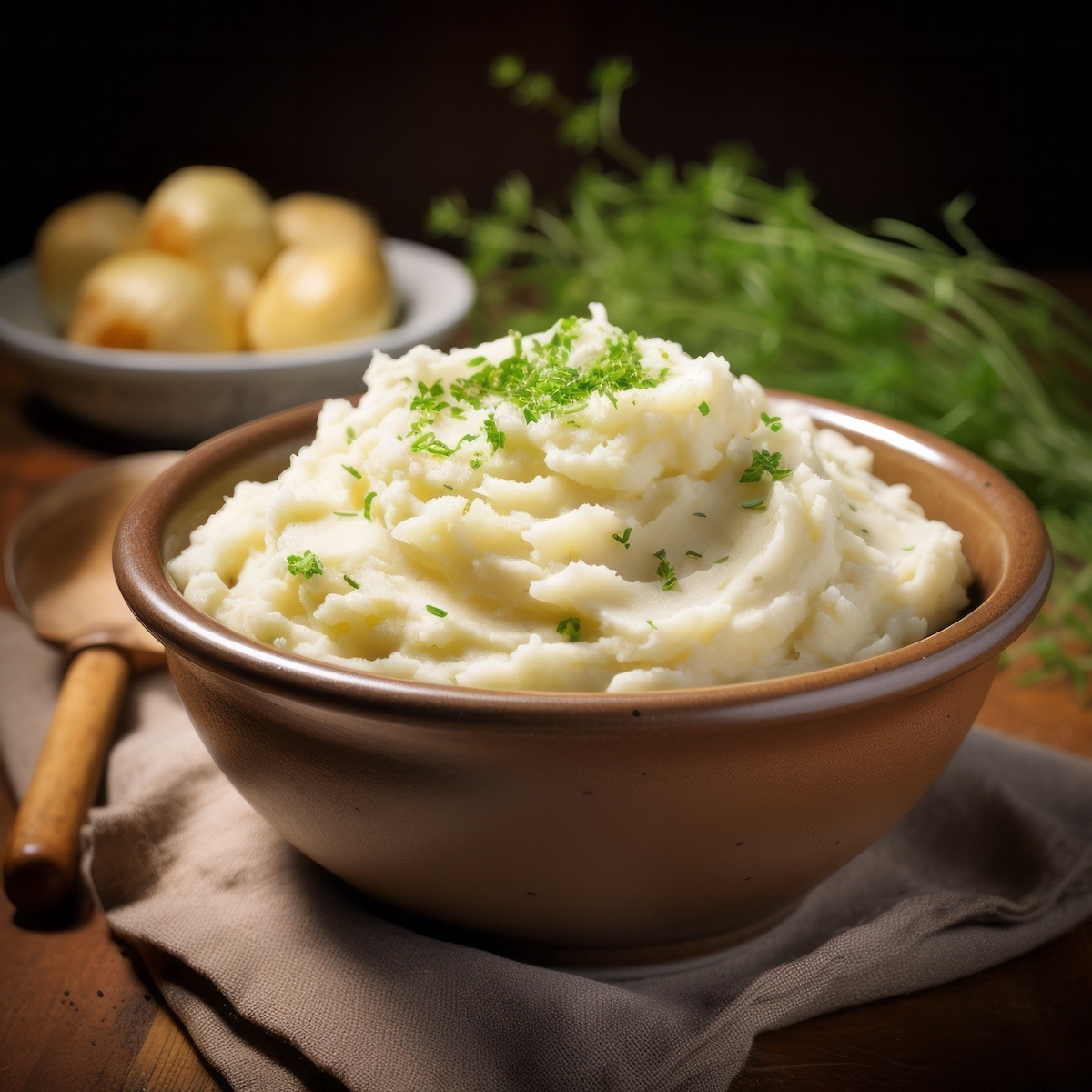
I’m watching my cholesterol.
Do I have to use butter in my mashed potatoes? Like dairy seems to be the go-to liquid for mashed potatoes, butter is the go-to fat.
Substitute for some or all of the butter with olive oil. I like to use extra virgin olive oil because I like the flavor, but you can use regular olive oil if you don’t like how assertive extra virgin olive oil is.
Of course, if you’re not watching your cholesterol, try using duck fat, chicken fat, or even bacon fat.
What can I do with my leftover mashed potatoes?
Mashed potatoes taste the best right after you cook them. We rarely have any leftover mashed potatoes because we really like them, but here are a couple of ideas if you find some leftover mashed potatoes on your hands.
a. Reheat them on the stove–not in the microwave–in a covered pan. Add a little bit of butter and the cooking liquid of your choice. Reheat them over medium heat, stirring occasionally only after they start warming up. The starches firm up in the refrigerator, so it will be easier to incorporate the extra ingredients once they warm up.
b. Mix in an egg for every cup of leftover potatoes you have. You can also add in some grated Parmesan cheese. Mix well and scoop 1/4 cup portions onto a hot griddle. Spread to about 1/2″ thick. Cook until golden brown, flip like a pancake, and cook the other side.
c. Make cream of potato soup. Mix leftover mashed potatoes with chicken stock and a touch of cream, heat, and season to taste.d. Heat them and spread them in a pie pan to make a “crust.” Fill with any savory meat and/or vegetable filling and bake for an unconventional “pot pie” or upside-down shepherd’s pie.
Can I Make My Mashed Potatoes the Day Before?
I’ve been getting many emails asking if I have a recipe or technique for preparing mashed potatoes the morning of or even the day before Thanksgiving. My answer is no. There are recipes for precooking mashed potatoes, but I’m afraid I have to disagree with any of them.
Mashed potatoes are one of the essential elements of Thanksgiving dinner, especially since they are the conduit for turkey gravy. However, not cooking, mashing, and serving right away is a bad idea and one I don’t subscribe to trying at your holiday dinner.
But because some of you don’t have a choice, will be pressed for time, and must cook your potatoes before the rest of the meal, you may want to check out Shirley O. Corriher’s recipe for Two-Step Mashed Potatoes from her cookbook CookWise. I have yet to try her recipe, but CookWise is a great cookbook and has been well-received over the years.
The Two Most Frequently Asked Questions About Mashed Potatoes
Potatoes have gotten a bad rap over the years. But the fault doesn’t lie with the potato, which is quite good for us. Instead, the fault lies in all the fatty and heavy ingredients we add to/put on top of potatoes.
The holiday season is one time when we would prefer not to worry about all that, though. I know that at the Thanksgiving table, there is nothing I look forward to more than rich and creamy mashed potatoes, and I refuse to apologize for it.
Mashed potatoes are a simple dish – comfort food at its best. But, for all their simplicity, people do tend to ask the same questions about making mashed potatoes year after year.
So, bookmark this article or print it out because here are Reluctant Gourmet’s definitive answers to this pair of persistent potato queries. And don’t forget to check out my recipe for great mashed potatoes.
Help! I have 16 coming for dinner. How many potatoes should I allow per person?
The most common answer to this question is to allow 1/3 to 1/2 pounds of raw potatoes per person. This translates to between 5 and 8 oz. of potatoes per person. That’s the simple answer, but many variables must be considered as with most seemingly straightforward questions.
Remember, for each eight oz, you’ll be mixing those potatoes with other ingredients. Of raw potato, you could have up to 1 pound of mashed potatoes.
And while I might load up with a majestic mound of mashers in the middle of my plate and then carefully place minuscule portions of cranberry, green beans, turkey, and dressing around the edges, many people will want to give equal time to all of the other traditional Thanksgiving offerings.
1. How are you going to make your mashed potatoes? Suppose you’re mashing them with chicken broth and some light margarine. In that case, you might consider allowing closer to 8 oz. of potato per person, but if your plans include creme fraiche, cream cheese, sour cream, heavy cream, or other rich and calorie-dense ingredients, go with no more than 5 ounces of raw potatoes per person.
2. Who are you serving? If your holiday table is decidedly child-heavy, allow two oz of raw potato per child. On the other hand, if you are entertaining the entire defensive line of the Philadelphia Eagles, you might go for closer to 10-12 oz. of raw potatoes per person. And if any of your dinner guests are on Atkin’s or are Somersizing, throw out all your calculations.
3. What else will you be serving? I’m a fan of starches, so I’m all for the stuffing-mashed potato-big fat dinner roll trifecta, but if you’re trying to offer a balance of proteins, carbs, and fats at your holiday table, consider the other starches on the menu.
Suppose you’re serving sweet potatoes, other root vegetables such as carrots, parsnips or turnips, stuffing or dressing, rolls or biscuits, or another potato dish. In that case, you might reduce the potatoes to only 3-4 oz. or so per person.
4. How will you be preparing your potatoes? If you’re just straight-up mashing the potatoes by hand, you will have a denser end product than if you use your mixer.
If you whip your potatoes, they will increase in volume because of whipping in some air, so you can probably get away with 3-4 oz. of potatoes per person if you are whipping them. When hand mashing, stick with 5-8 oz.
Help! I only have so many burners on my stovetop. Can I make the mashed potatoes ahead of time and reheat them in the oven the next day?
The short answer is, “No, please don’t do that.” But, since I want you to understand why I’m telling you what I’m telling you, I will elaborate.
Potatoes contain large starch granules, especially those we like to use for mashed potatoes (Russets and even Yukons). The starch granules swell up or gelatinize when we cook them, giving us the light and fluffy texture we expect in a potato.
Agitating the potatoes while they are still warm breaks up these fluffy starch granules. That’s how we get a nice and creamy mashed potato. Here’s the problem, though. Once your wonderfully warm and creamy mashed potatoes cool, the starches firm up, leaving you with cold and clumpy glue.
If you must reheat your mashed potatoes, cook and mash just the potatoes the day before. Then, reheat with your additional ingredients right before serving. But, of course, you’ll still be left with the issue of burner space.
An alternative is to mash the potatoes the day before with all your other ingredients but with more liquid than you would typically use. You’ll want the potatoes to be a bit looser in consistency than how you would typically serve them. When you reheat them, your potatoes should have the right consistency for serving.
Another trick I have seen for reheating mashed potatoes is holding them in a low crock pot. This might be an option for you if you have the counter space. I recommend stirring them periodically to keep them as evenly heated as possible.
You should not try and reheat the potatoes without agitating them unless you want a more sliceable end product. If you want a fresh-mashed consistency, use a masher again or stir them vigorously with a spoon.
And there you have it. However, I hope I have helped you consider the many variables inherent in planning potato quantities and given you my best advice about reheating mashed potatoes.
I hope you have a healthy and happy holiday season, and think of me kindly when you hear someone say, “Pass the potatoes, please!”
Secrets to Mashed Potatoes from a Master Chef
After reading this email from Master Chef Kuntze, I realized how much I could learn about cooking. I have my own Perfect Mashed Potatoes recipe that I’ve been using for years, but now I have a better understanding of the basics. As Chef Hartmut says in my Novice to Pro Interview, “Learn methods instead of recipes. Perfect the basics.”
On Preparing Mashed Potatoes
Dear Reluctant Gourmet,
It all boils down to the basics. Kennebec, Yukon gold, yellow Finn, or Russets, all starchy as opposed to waxy potatoes, are acceptable.
Dairy product of your choice. I prefer milk, regular 4%. Unfortunately, it has to be scalded and can only be added once the potatoes are mashed, and the lumps are gone.
How much is hard to say because the starch content of the potatoes varies with type and time of year, even storage (sugar will convert to starch or vice versa, depending on storage temperature). However, usually, 25%+ is the correct ratio, which means 1/2 cup per pound of potatoes.
Butter would be 2 ounces per pound of potatoes.
Kosher Salt, Pepper (white), and a pinch of nutmeg. Nutmeg will remove the “cellar flavor” of the potato, especially late in the season.
We usually steam our potatoes to get them tender, starchy, and dry, but that is only sometimes possible at home. Boiling in salted water, just enough to cover and start hot, is OK, too. It is essential to cook them to the right stage, tender but not falling apart and draining them well.
They must be pureed immediately; boiling milk can be added once the lumps are gone. I use a Hobart mixer and a Kitchen Aid mixer for smaller quantities, but so will a wire whisk.
Using heavy cream instead of milk and whipping them will turn them into very fluffy mousseline potatoes. If the potatoes are not cooked enough, they tend to get gummy. If the liquid is added before the potatoes are smooth, they will be lumpy.
The butter and seasonings can be added at any stage. I prefer Kosher salt because it dissolves faster and tastes better. And it has no garbage added. The mashed potatoes will tighten as they sit and become blander. The starch is doing that, so make them a little looser and tastier than you would serve them.
I also like to add some roasted garlic puree, approximately 1/2 ounce or 1 TB per serving. Of course, you can also roast whole garlic the usual way, squeeze and puree that and add it.
Chef Kuntze

